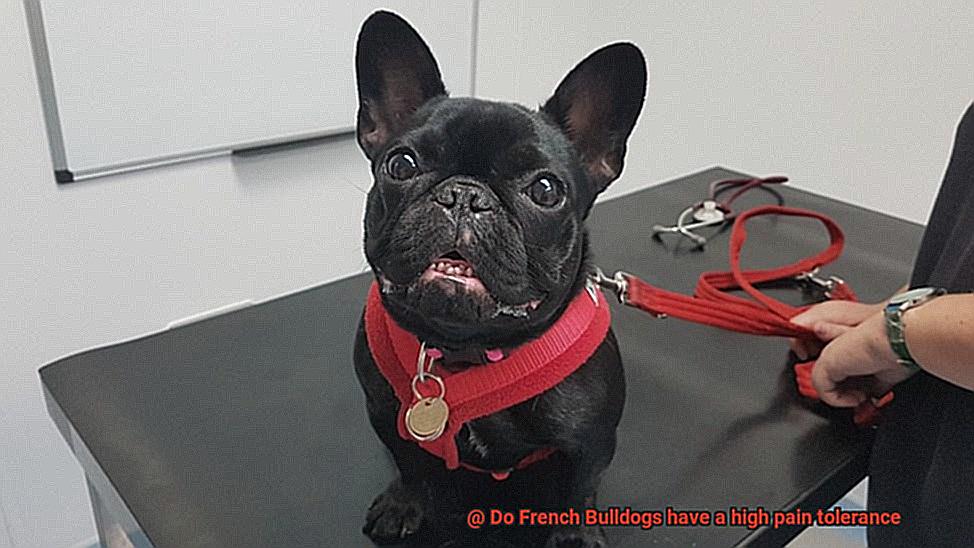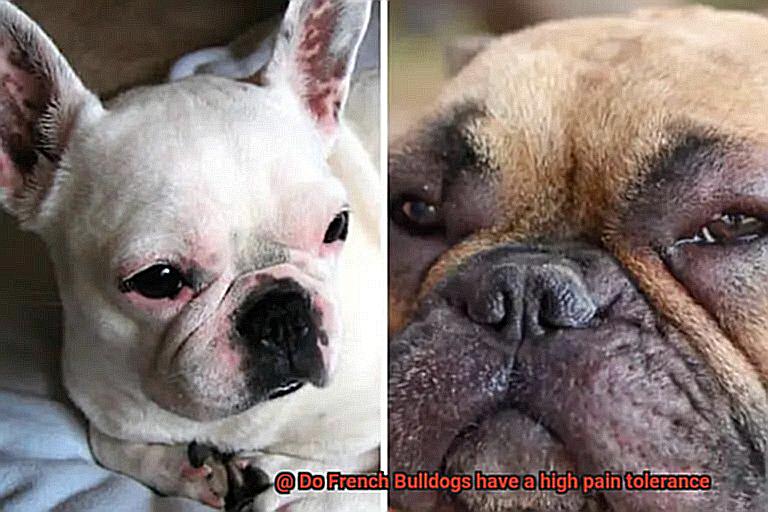Do French Bulldogs have a high pain tolerance?
French Bulldogs, those adorable bundles of joy with their unique looks and charming personalities, have captured the hearts of dog lovers everywhere. But there’s more to these pint-sized pups than meets the eye.
One burning question has ignited curiosity and sparked debates among owners and experts alike: do French Bulldogs have a high pain tolerance? Today, we’re diving deep into their physical traits, temperament, and scientific studies to unravel the mystery behind these resilient little canines.
Get ready to discover the fascinating world of French Bulldogs and their ability to withstand discomfort.
Understanding the History Behind French Bulldogs’ Pain Tolerance
Contents
- 1 Understanding the History Behind French Bulldogs’ Pain Tolerance
- 2 The Role of Genetics in a French Bulldog’s Pain Tolerance
- 3 How Age and Health Conditions Impact a French Bulldog’s Pain Tolerance
- 4 Recognizing Signs of Pain in French Bulldogs
- 5 Seeking Veterinary Care for Your French Bulldog’s Pain Management
- 6 Common Medications Used to Manage Pain in French Bulldogs
- 7 Alternative Therapies for Managing Pain in French Bulldogs
- 8 Tips for Preventing and Minimizing Pain in Your French Bulldog
- 9 Conclusion
In this article, we’ll delve into the fascinating history behind French Bulldogs’ pain tolerance and how it has influenced their popularity as beloved companion animals.
Origins in Ratting and Bull-Baiting:
French Bulldogs have their roots in England during the 1800s, where they were originally bred for ratting and bull-baiting purposes. Bull-baiting was a popular sport at the time, which required dogs with exceptional pain tolerance and tenacity. To create the French Bulldog breed, breeders crossed sturdy and resilient ancestors such as the English Bulldog and Terrier breeds, resulting in a dog with similar pain tolerance traits.
Transition to Companion Animals:
In the mid-19th century, bull-baiting was banned, leading to a decline in the demand for these courageous dogs. However, French Bulldogs began to gain popularity as delightful companion animals due to their charming personalities and adaptability. Despite their smaller size compared to their ancestors, French Bulldogs still retain some of the pain tolerance characteristics that were necessary for their original purpose.
Stoic Nature:

French Bulldogs are known for their stoic nature, which means they may not always exhibit obvious signs of discomfort or pain. This can make it challenging for owners to assess their pet’s well-being accurately. As responsible pet owners, it is crucial to be proactive in monitoring our French Bulldogs’ health and seeking veterinary care when needed.
Factors Influencing Pain Tolerance:

While genetics play a role in determining a French Bulldog’s pain tolerance, other factors such as upbringing, overall health, and individual differences also come into play. It is important to remember that pain tolerance can vary among individual dogs, even within the same breed.
The Role of Genetics in a French Bulldog’s Pain Tolerance
Here, we will embark on a fascinating journey to explore the role of genetics in a French Bulldog’s pain tolerance.
Unraveling the Genetic Code:
Genetics holds the key to unlocking the mysteries behind a French Bulldog’s pain threshold. Just like humans, dogs inherit certain traits from their parents through genes. These genes can influence various aspects of their physical and behavioral characteristics, including how they perceive and tolerate pain.
The COMT Gene:

One gene that has piqued the interest of researchers studying pain tolerance in dogs is the COMT gene. This gene is responsible for the breakdown of neurotransmitters such as dopamine and norepinephrine in the brain. Dogs with a specific variant of the COMT gene may have a higher pain threshold and exhibit greater resilience to discomfort.

The SCN9A Gene:
Another genetic player in the realm of pain tolerance is the SCN9A gene. This gene produces a protein called Nav1.7, which plays a crucial role in transmitting pain signals. Dogs with certain variants of the SCN9A gene may have altered Nav1.7 channels, resulting in either heightened or reduced sensitivity to pain.
The Puzzle of Individual Differences:

While genetics certainly plays a role, it is important to remember that pain tolerance is influenced by multiple factors. Each French Bulldog is an individual with unique experiences and temperament.
Previous encounters with pain, upbringing, and overall health can also contribute to their perception and tolerance of discomfort.

Breeding Practices and Pain Tolerance:
Responsible breeders play a significant role in shaping a French Bulldog’s pain tolerance. By selecting breeding pairs with favorable pain tolerance traits, breeders can potentially produce offspring with a higher pain threshold.
However, it is crucial to prioritize the overall health and well-being of the dogs and avoid extreme breeding practices that may compromise their welfare.
Conclusion:
In the intricate tapestry of a French Bulldog’s pain tolerance, genetics undoubtedly weaves an essential thread. The COMT and SCN9A genes hold the promise of shedding light on their resilience or sensitivity to pain.
However, individual temperament, past experiences, and overall health also contribute to their unique pain perception.
By understanding the role genetics play in a French Bulldog’s pain tolerance, we can make informed decisions to ensure their well-being and provide them with the love and care they deserve.
How Age and Health Conditions Impact a French Bulldog’s Pain Tolerance
French Bulldogs, those adorable wrinkled pups with their signature bat ears, can vary in their pain tolerance levels just like any other dog breed. So, what factors impact their pain threshold?
Let’s explore how age and health conditions play a significant role in shaping a French Bulldog’s pain tolerance.
Age: Young and Playful vs. Mature and Wise
Just like humans, age can influence a French Bulldog’s pain tolerance. Puppies, with their boundless energy and curiosity, may not have developed a high threshold for pain yet.
They are more sensitive to discomfort or injuries and require gentle handling and cautious play to prevent any unnecessary pain.
On the other hand, adult and senior French Bulldogs have had time to mature both physically and mentally. Their nervous system is more developed, allowing them to have a higher pain tolerance compared to their younger counterparts.

These wise seniors have also accumulated life experiences that may have toughened them up a bit.
Health Conditions: The Painful Truth
Health conditions can significantly impact a French Bulldog’s pain tolerance. Chronic illnesses, such as arthritis or hip dysplasia, can cause ongoing pain that affects their overall threshold for discomfort.
Imagine having to deal with joint pain every time you take a step. These conditions can make even the toughest French Bulldog more sensitive to pain.

On the flip side, a healthy French Bulldog without any underlying health issues may have a higher pain tolerance. Their bodies are not constantly under stress from chronic ailments, allowing them to handle discomfort better.
Every Dog is Unique: Individuality Matters
It’s important to remember that each French Bulldog is an individual with their own unique set of genes, experiences, and temperament. While age and health conditions provide general guidelines about pain tolerance, there can be significant variations within these categories.
Some French Bulldogs may naturally have a higher threshold for pain, while others may be more sensitive. That’s why it’s crucial for owners to observe their dog’s behavior and consult with a veterinarian if they suspect their French Bulldog is experiencing pain or discomfort.
Managing Pain: A Tail-Wagging Solution
When it comes to managing a French Bulldog’s pain, age and health conditions should be taken into consideration. Here are a few tips:
- Puppy-proof your home: Provide a safe environment for young pups to minimize the risk of injuries.
- Regular check-ups: Schedule regular veterinary check-ups to monitor your French Bulldog’s overall health and detect any potential health conditions that could impact their pain tolerance.
- Pain management strategies: If your French Bulldog has health issues, consult with your veterinarian about pain management strategies such as medication, physical therapy, or alternative treatments like acupuncture.
- Comfort is key: Provide appropriate bedding and avoid excessive exercise or strenuous activities that could exacerbate existing conditions.
Recognizing Signs of Pain in French Bulldogs
French Bulldogs are adorable and lovable companions that bring joy to our lives. However, just like any other living being, they can experience pain and discomfort.
As responsible pet owners, it is crucial for us to be able to recognize the signs that indicate our French Bulldogs may be in pain.
In this article, we will explore some common signs of pain in French Bulldogs and discuss how we can help alleviate their discomfort.
Change in Behavior
If your normally energetic and playful French Bulldog suddenly becomes withdrawn or shows a lack of interest in activities they once enjoyed, it could be a sign that they are experiencing pain.
Keep an eye out for any changes in their behavior, such as increased aggression or unusual irritability. These can be indicators that your furry friend is feeling uncomfortable.
Eating Habits
A change in eating habits can also be a sign of pain in French Bulldogs. They may lose their appetite or show reluctance to eat. Conversely, some dogs may overeat or exhibit excessive thirst as a response to pain.
It is important to monitor your French Bulldog’s eating habits closely and consult with a veterinarian if you notice any significant changes.
Physical Signs
Physical signs can provide valuable insight into whether your French Bulldog is in pain. Watch out for limping, favoring a certain leg or body part, or difficulty in getting up or lying down.
If your dog displays sensitivity when touched or reacts negatively to certain movements, it could be a sign that they are experiencing discomfort. Changes in posture or gait can also indicate potential sources of pain.
Facial Expressions
French Bulldogs have expressive faces, and paying attention to their facial expressions can give clues about their pain levels. Furrowed brows, tight lips, or squinting eyes may indicate discomfort.
Excessive panting, drooling, or heavy breathing can also be signs of pain. By familiarizing yourself with your French Bulldog’s typical facial expressions and monitoring for any deviations, you can better understand when they may be experiencing pain.
Bathroom Habits
Changes in bathroom habits can also point to pain in French Bulldogs. If your dog suddenly starts having accidents indoors or experiences difficulty urinating or defecating, it may be a sign of an underlying issue causing pain.
Pay attention to any changes in frequency, consistency, or color of their stool or urine, as these can provide valuable information for your veterinarian to diagnose and treat the source of the pain.
Seeking Veterinary Care for Your French Bulldog’s Pain Management
Despite their tough exterior, these little bundles of joy can experience various forms of pain that require proper veterinary care. In this article, we will explore the importance of seeking veterinary care for your French Bulldog’s pain management and provide valuable insights to ensure their well-being and happiness.
Recognizing the Signs of Pain:
French Bulldogs are known for their expressive faces, making it easier for us to spot signs of discomfort.
Look out for changes in behavior such as decreased activity levels, reluctance to move or jump, excessive panting, whimpering or crying, and changes in appetite or drinking habits.

Consulting with a Veterinarian:
When you notice any signs of pain in your French Bulldog, it is crucial to consult with a veterinarian. They are the experts who can accurately diagnose the cause of your dog’s pain and recommend appropriate treatment options. Home remedies may not provide adequate relief or may even worsen the condition, so it’s best to seek professional guidance.
Understanding Treatment Options:
Depending on the underlying cause of your French Bulldog’s pain, your veterinarian may recommend various treatment options. These can range from medication to physical therapy or even surgery in severe cases. Pain medication such as nonsteroidal anti-inflammatory drugs (NSAIDs) or opioids may be prescribed, but it is important to follow your veterinarian’s instructions regarding dosage and administration.
Complementary Therapies:
In addition to medication, complementary therapies such as acupuncture or laser therapy may also be recommended by your veterinarian. These alternative treatments can help alleviate pain and promote healing in your French Bulldog.
Discuss these options with your veterinarian to determine if they are suitable for your furry friend.
The Importance of Regular Follow-up Appointments:
Pain management is not a one-size-fits-all approach, and regular follow-up appointments with your veterinarian are crucial. These appointments allow for monitoring the effectiveness of the treatment plan and making any necessary adjustments to ensure your French Bulldog’s comfort and well-being.
Your Role as a Loving Owner:
While veterinary care is essential, you also play a vital role in your French Bulldog’s pain management. Provide a comfortable and safe environment for them, ensure they have a balanced diet and regular exercise, and monitor their behavior for any signs of discomfort that may require veterinary attention.
Common Medications Used to Manage Pain in French Bulldogs
When it comes to managing pain in our beloved French Bulldogs, there are several common medications that veterinarians may prescribe.
It’s important to remember that these medications should always be given under the guidance and supervision of a veterinarian.
Let’s take a closer look at some of these medications and how they work.
Nonsteroidal anti-inflammatory drugs (NSAIDs) are a common choice for managing pain in French Bulldogs. These medications work by reducing inflammation and providing relief from pain. Carprofen, meloxicam, and deracoxib are examples of NSAIDs that your vet may prescribe for your furry friend.
Opioids are another class of medications that can be used to manage pain in French Bulldogs. These medications work by blocking pain signals in the body. Tramadol and codeine are commonly prescribed opioids for our four-legged friends.

In some cases, corticosteroids may be used to manage pain in French Bulldogs. These medications help reduce inflammation and suppress the immune system. However, it’s important to note that long-term use of corticosteroids can have side effects, so their use should be closely monitored by your vet.
Gabapentin is a medication that is sometimes used to manage chronic pain in French Bulldogs. It works by reducing abnormal electrical activity in the brain and nervous system. Gabapentin is often used in combination with other pain medications for maximum effectiveness.
In addition to oral medications, there are also topical medications available for managing pain in French Bulldogs. These medications are applied directly to the affected area and can provide targeted relief. Lidocaine patches and creams are examples of topical medications that may be recommended by your vet.
It’s crucial for owners to follow their veterinarian’s instructions regarding medication dosage and administration. Giving too much medication or giving it too frequently can have adverse effects on your furry friend. It’s also important to be aware of potential side effects associated with these medications, such as gastrointestinal upset, drowsiness, or changes in appetite. If you notice any unusual symptoms, it’s essential to contact your veterinarian immediately.
While medications can be effective in managing pain, it’s worth considering non-pharmacological methods as well. Physical therapy, acupuncture, and laser therapy are just a few examples of alternative treatments that can be used in conjunction with medication or as standalone options depending on your French Bulldog’s specific needs.
Remember, being a responsible owner means monitoring your French Bulldog closely when they’re on pain medication. Watch for any changes in behavior, appetite, or overall well-being. Regular check-ups with your veterinarian are also crucial to assess the effectiveness of the medication and make any necessary adjustments to the treatment plan.

Alternative Therapies for Managing Pain in French Bulldogs

French Bulldogs are known for their playful and energetic nature, but just like any other dog breed, they can experience pain and discomfort due to various conditions such as arthritis, injuries, or surgery.
While traditional pain management medications can be effective, some pet owners are turning to alternative therapies to help alleviate their French Bulldogs’ pain.

These alternative therapies can be used alongside traditional treatments or as standalone options. Let’s explore some of the most popular alternative therapies for managing pain in French Bulldogs.
- Acupuncture: This ancient Chinese practice involves the insertion of thin needles into specific points on the body to stimulate healing and relieve pain. Acupuncture has shown promising results in managing pain in dogs, including French Bulldogs. It is believed to promote the release of endorphins, which are natural painkillers, and improve blood flow to the affected areas.
- Chiropractic Care: Chiropractic adjustments focus on aligning the spine and musculoskeletal system. Misalignments in these areas can contribute to pain and discomfort. A certified animal chiropractor can perform gentle adjustments to help realign the spine and relieve pressure on nerves, reducing pain and improving mobility.
- Physical Therapy and Rehabilitation Exercises: Just like humans, dogs can benefit from physical therapy and rehabilitation exercises. These exercises aim to strengthen muscles, improve range of motion, and reduce discomfort. A professional therapist will create a tailored exercise plan for your French Bulldog to target their specific needs.
- Massage Therapy: Who doesn’t love a good massage? Dogs can benefit from massage therapy too. Massage helps relax muscles, increase circulation, and release endorphins, providing natural pain relief. It can also help with muscle tension and stiffness caused by conditions like arthritis.
- Cold Laser Therapy: Cold laser therapy is a non-invasive treatment that uses low-level laser light to reduce inflammation and promote healing. It can be particularly useful for managing pain caused by arthritis or muscle strains. The laser light penetrates deep into the tissues, stimulating cellular activity and reducing pain and inflammation.
- Herbal Remedies and Supplements: Some herbal remedies and supplements can help manage pain and inflammation in French Bulldogs. Turmeric and ginger, for example, have natural anti-inflammatory properties. However, it’s important to consult with a veterinarian before giving your dog any herbal remedies or supplements to ensure their safety and effectiveness.
Remember, it’s crucial to work with a veterinarian or certified professional when considering alternative therapies for pain management in French Bulldogs. They can assess your dog’s specific condition and recommend the most suitable therapies. Additionally, they can monitor your dog’s progress and adjust the treatment plan if needed.
Tips for Preventing and Minimizing Pain in Your French Bulldog
Due to their stoic nature, they may not always show obvious signs of pain.
As a responsible owner, it is important to be proactive in preventing and minimizing pain in your French Bulldog to ensure their well-being. In this comprehensive guide, we will provide you with helpful tips and insights on how to keep your furry friend pain-free.
Maintain a Healthy Weight:
Keeping your French Bulldog at a healthy weight is crucial for preventing pain. Obesity can put extra stress on their joints and bones, leading to conditions such as arthritis and hip dysplasia. Provide them with a balanced diet and regular exercise to help them stay fit and reduce the risk of painful conditions.
Proper Grooming:
Regular grooming is essential for preventing pain and discomfort in French Bulldogs. Their short coat requires frequent brushing to prevent matting and skin irritations. Additionally, keeping their nails trimmed will prevent discomfort and potential injuries from overgrown nails.
Provide a Comfortable Sleeping Area:
Investing in a high-quality orthopedic bed can provide your French Bulldog with a comfortable and supportive sleeping area. This helps alleviate pressure points and provides relief for any existing joint or muscle issues.
Regular Veterinary Check-ups:
Routine check-ups are vital for identifying and addressing any potential sources of pain. Regular examinations can catch early signs of dental disease, ear infections, or other health issues that may cause discomfort. Vaccines and preventive medications can also protect against illnesses that could lead to pain or discomfort.
Be Observant of Behavior Changes:
Pay close attention to any changes in your French Bulldog’s behavior or mobility. If you notice signs of pain such as limping, reluctance to move or play, or changes in appetite or behavior, seek veterinary attention promptly. Early intervention can prevent further pain or complications.
Em5WE9QFfa0″ >
Conclusion
French Bulldogs are known for their adorable appearance and playful nature.
However, when it comes to pain tolerance, these little pups are surprisingly tough. Despite their small size, French Bulldogs have a high threshold for pain.
They can endure discomfort without showing much outward distress. This resilience is due to their stoic nature and genetic makeup.
French Bulldogs were originally bred as companion dogs, but they also have a history of being used in bull-baiting sports. This background has contributed to their ability to withstand pain.
Their muscular build and sturdy frame provide them with a solid foundation that helps them cope with physical discomfort. Additionally, French Bulldogs have a strong willpower and an innate desire to please their owners, which allows them to push through pain and continue on with their daily activities.
However, it’s important to note that just because French Bulldogs have a high pain tolerance doesn’t mean they should be subjected to unnecessary discomfort or injury.




